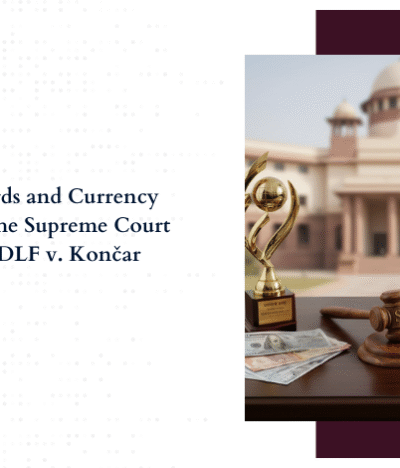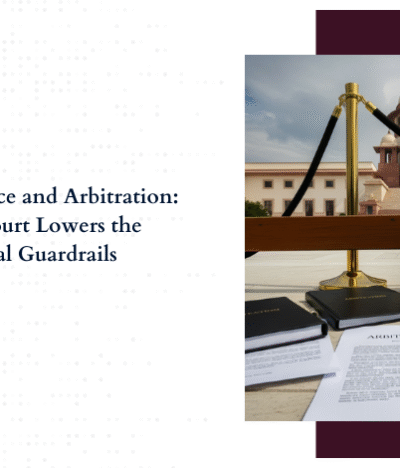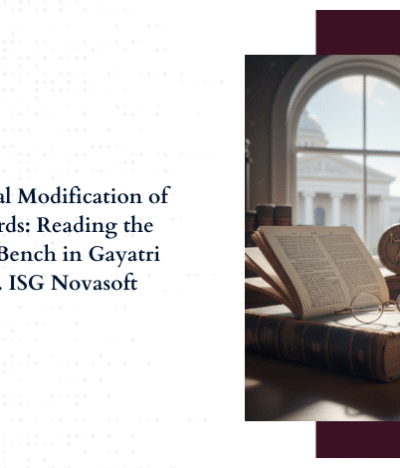In arbitration proceedings, the allocation of interestateither the pre-award stage and/ or at the post-award stage can have significant financial implications for the parties involved.
The Supreme Court’s recent ruling in R.P GARG V. THE CHIEF GENERAL MANAGER, TELECOM DEPT & ORS. [2024 INSC 743], clarifies this aspect under the Arbitration and Conciliation Act, 1996. It specifically delves into the contentious issue of whether parties can contract out of post-award interest, even if their agreement expressly prohibits it.
This article aims to examine this crucial decision by the Supreme Court, which set aside a High Court judgment and reaffirmed the statutory right to post-award interest under Section 31(7)(b) of the Arbitration and Conciliation Act, 1996. In the sections that follow, a comprehensive analysis of the case law, the legal principles governing post-award interest, and the broader implications of this decision for arbitration disputes have been discussed.
Brief Facts of the Case
On 17.10.1997, the appellant contractor entered into a contract with the Telecom Department of Haryana to trench and lay underground cables, requiring a security deposit of Rs. 10 lakhs. Thereafter, disputes regarding unpaid bills arose, which led to the appointment of an arbitrator on 24.10.2000 under Section 11 of the Arbitration and Conciliation Act, 1996.
The arbitrator issued a Final award on 08.03.2001, favouring the appellant and allowing his claims but denied his request for interest due to a specific clause in the arbitration agreement that prohibited the payment of interest.
While executing the award, the appellant sought post-award interest by raising a specific objection. However, the Civil Judge dismissed this objection and upheld the Final award. The appellant thereafter appealed before the District Judge wherein the appeal was granted and the Court ordered the payment of post-award interest at a rate of 18% on the awarded amount.
Challenging the District Judge’s order, a Civil Revision Petition was filed before the High Court, which granted the petition and set aside the award of post-award interest. The High Court examined sub-clause (iv) of Clause 1 of the contract and held that the said clause constituted an agreement to prohibit the grant of interest. While observing the same, the High Court relied on the precedent set in Jaiprakash Associates Ltd. v. Tehri Hydro Development Corporation (India) Ltd., concluding that interest cannot be awarded when explicitly prohibited by the contract.
Issues
The primary legal issue entailed, in this case, is whether the appellant is entitled to post-award interest on the sum awarded by the arbitrator, raising the broader question of whether party agreements can exclude the statutory right to such interest as specified under Section 31(7)(b) of the Arbitration and Conciliation Act, 1996.
Analysis Of The Case
The Hon’ble Apex Court found the High Court’s judgement to be erroneous, emphasizing that the interest granted by the First Appellate Court pertained only to the post-award period, making any agreement between the parties irrelevant for this duration.
Section 31(7)(b) of the Arbitration and Conciliation Act specifically addresses the award of interest from the date of the award until its realization, distinguishing it from pre-award interest governed by Section 31(7)(a), which allows for interest only as per the parties’ agreement.
This distinction highlights that while pre-award interest is contingent on the parties’ agreement, post-award interest is a statutory right that cannot be overridden by contract.
In accordance with Section 31(7)(b) any amount awarded by the Arbitral Tribunal will carry interest, with the arbitrator determining the rate; in the absence of such a determination, the statutory rate applies. Unlike clause (a), which allows for party agreements, clause (b) cannot be overridden by the parties, meaning they cannot waive their right to post-award interest.
The phrase “unless the award otherwise directs” in Section 31(7)(b) relates only to the interest rate, not the entitlement itself. Therefore, the distinction in Section 31(7)(b) emphasizes that awarded interest takes precedence over the statutory rate, making the High Court’s view that post-award interest depends on the contract a clear error.
The Court referred to the judgement in Morgan Securities & Credits (P) Ltd. v. Videocon Industries Ltd. to hold that the legal position enabling post-award interest is not subjected to the realms of the contract that subsists between the parties. Hence, the top court held that the High Court erred in relying on the judgment from Jaiprakash (Supra), which pertains to the prohibition of pendente lite interest, as it does not apply to the present case involving post-award interest.
Consequently, the Supreme Court allowed the appeal, set aside the High Court’s judgment and restored the First Appellate Court’s decision which granted interest at a rate of 18% per annum.
Conclusion
This ruling on post-award interest under Section 31(7)(b) of the Arbitration and Conciliation Act, 1996reaffirms the statutory right to interest that cannot be waived by contractual agreement. It clarifies that post-award interest is a legal entitlement, regardless of contract provisions that seek to limit it.
By distinguishing between pre-award and post-award interest, the Court emphasizes that the latter is designed to ensure fair compensation and timely payment. The ruling not only resolves the specific case but also sets a crucial precedent for future arbitration disputes, enhancing confidence in the arbitration process.
By establishing that parties cannot contractually eliminate their right to post-award interest, the Court promotes fairness and efficiency, ultimately benefiting all stakeholders involved.

![R.P Garg V. The Chief General Manager, Telecom Dept & Ors. [2024 Insc 743]](https://www.acmlegal.org/wp-content/uploads/2024/10/R.P-Garg-V.-The-Chief-General-Manager-Telecom-Dept-Ors.-2024-Insc-743.jpg)




